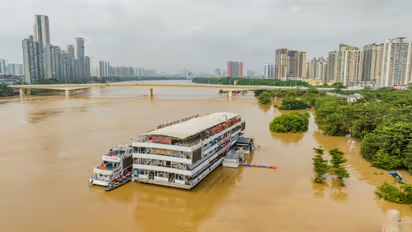'Worst floods in 30 years': Thousands evacuated as Typhoon Yagi wreaks havoc in Vietnam, over 170 dead (WATCH)

Synopsis
Thousands of residents in Hanoi and surrounding areas have been evacuated as severe flooding caused by Typhoon Yagi continues to devastate northern Vietnam.
Thousands of residents in Hanoi and surrounding areas have been evacuated as severe flooding caused by Typhoon Yagi continues to devastate northern Vietnam. The powerful typhoon, Asia’s strongest storm this year, made landfall last Saturday, triggering deadly floods and landslides across the region.
According to government estimates, the typhoon, along with subsequent floods and landslides, has claimed 179 lives, with 145 people still missing. The death toll is expected to rise as rescue and recovery operations continue. In response, authorities have advised schools across Hanoi to remain closed for the week, and many families in low-lying areas have been relocated to safer zones.
Nguyen Van Hung, a 56-year-old resident living near the Red River, described the catastrophic situation. "My home is now part of the river," he said, standing among the debris of what used to be his property. Thousands like him have been displaced, with emergency shelters set up in various parts of the capital.
Widespread impact across Hanoi and surrounding areas
Floodwaters from the Red River, which has reached its highest level in 20 years, have inundated large portions of the city. Tran Le Quyen, a 42-year-old Hanoi resident, said her house, which was dry only a day ago, is now surrounded by water. "This is the worst flood I have seen in 30 years," she said, echoing the fears of many in the region.
The flooding has also affected industrial hubs to the east of the city, where many multinational companies, including Samsung Electronics, operate factories and warehouses. Temporary shutdowns due to flood damage are expected to disrupt global supply chains, raising concerns about potential delays in products such as smartphones.
Power cuts and safety concerns
The state-run power company, Vietnam Electricity (EVN), has cut power to some flood-hit parts of the capital to prevent electrocutions and other accidents. EVN also announced on Wednesday that it had stopped discharging water from the Hoa Binh hydropower dam, one of the largest in northern Vietnam, into the Red River’s Da tributary to help control water levels downstream.
However, the threat of further flooding remains high. Mai Van Khiem, director of the National Center for Hydro-Meteorological Forecasting, warned that more rain is expected in the next 48 hours, raising fears of further rises in water levels.
In a troubling development, Vietnamese officials expressed concern over the potential release of water from Chinese hydropower plants into the Lo River, which flows into the Red River. Both Vietnamese and Chinese authorities have assured citizens that the two countries are working together to manage flood risks.
Charitable organizations and local residents are also grappling with the crisis. The Blue Dragon Children’s Foundation, a charity based near Hanoi's city centre, evacuated its offices on Tuesday. "People are moving their belongings and vehicles as quickly as they can," said Carlota Torres Lliro, a spokesperson for the foundation, adding that there are grave concerns for people living in slum areas, where flooding has been especially devastating.
Nguyen Duc Tam, a resident of Thai Nguyen, located 60 kilometres from Hanoi, painted a grim picture of the situation in northern provinces. "My house's first floor is completely under the water," he said, noting that many residents are now without fresh water or electricity. Floodwaters and landslides have damaged homes and infrastructure across the region, leaving many isolated and desperate for aid.
Ongoing relief efforts and concerns
With recovery efforts underway, authorities are working to provide emergency supplies and shelter to those displaced by the floods. However, the challenges remain immense, especially with the prospect of more rain in the coming days. Hoang Hai Luan, a long-term resident, remarked, "For more than 20 years that I've lived here, I've never seen such historic flooding." The damage to homes, businesses, and livelihoods is expected to take months, if not longer, to fully repair.
As Vietnam battles to recover from the devastation caused by Typhoon Yagi, the focus now shifts to managing the immediate risks posed by rising water levels and further rainfall, as well as the long-term rebuilding of affected communities.
Check the Breaking News Today and Latest News from across India and around the world. Stay updated with the latest World News and global developments from politics to economy and current affairs. Get in-depth coverage of China News, Europe News, Pakistan News, and South Asia News, along with top headlines from the UK and US. Follow expert analysis, international trends, and breaking updates from around the globe. Download the Asianet News Official App from the Android Play Store and iPhone App Store for accurate and timely news updates anytime, anywhere.